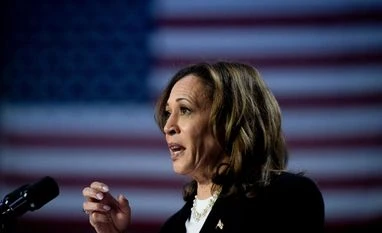By Alicia Diaz, Jennifer Epstein and Josh Wingrove
The battle between Kamala Harris and Donald Trump over the economy is set to intensify, with the rival presidential candidates planning dueling addresses this week on one of the campaign’s defining issues.
Harris told reporters Sunday she will deliver a speech “to outline my vision for the economy.” Trump, meanwhile, is set to offer remarks Tuesday in swing-state Georgia on a plan to lower taxes for US business owners.
The events show how the economy has become an election focal point with Harris and Trump offering a slew of competing proposals to push tax breaks, credits and other programs to address voter anxiety over high prices, jobs and wages. With the candidates embarking on a six-week sprint to Election Day, each is angling for any advantage they can find.
Americans’ angst over the economy has been a political liability for Harris – and President Joe Biden – that’s souring voter perceptions of their administration’s record. And it’s been a boost for Trump and his unprecedented campaign as the first former US president convicted of a felony.
The Republican presidential nominee has promised to slash regulations and renew expiring tax cuts — policies that have helped him rebuild support among many Wall Street executives and corporate leaders who shunned him after the 2020 election.
More From This Section
In recent days, Harris and Trump have both also sought momentum from the Federal Reserve’s decision to lower its benchmark interest rate by a half percentage point.
Harris hailed it as a sign of progress in the fight against inflation and a vindication of Biden administration’s policies, while saying more needs to be done. Trump lambasted the cut as a “political” decision to protect Harris and said the move suggests the US economy is in poor shape.
Harris has also sought to bolster her standing with business, saying she would help grow emerging sectors. At a Manhattan fundraiser on Sunday she told donors she would support investments in digital assets and artificial intelligence. Trump, a onetime skeptic of cryptocurrencies, has courted the industry strongly this cycle.
A Bloomberg News/Morning Consult poll from August showed voters less likely to hold Harris responsible for the economic anxiety that undercut Biden even as they said they were better off under Trump.
A poll Sunday, though, showed Harris narrowing Trump’s advantage on whom voters trust more on the economy. The September CBS/Ipsos poll found Harris narrowed her deficit among voters who care most about the issue, with Trump leading 53 per cent to 47 per cent among that subset, compared with 56 per cent to 43 per cent in August.
Harris address
Harris said Sunday that her speech will explain how she intends to “do more to invest in the aspirations and ambitions of the American people while addressing the challenges they face, whether it be the high price of groceries or being able to acquire homeownership.”
Plans for Harris’ address this week aren’t finalised yet, a person familiar with the Democratic presidential nominee’s plans said Sunday.
The address will be more sweeping in tone rather than focused on any proposal or set of policy items, according to the person, who cast it as an opportunity to communicate with voters who say they still don’t know enough about Harris or her policies.
Reuters reported earlier that Harris plans to present economic policy proposals this week, including ways to promote wealth creation for Americans.
Harris has unveiled initiatives to help curb costs for households, offer assistance for first-time homebuyers, expand a tax break for small business startups as well as proposing to eliminate taxes on tips for service industry and hospitality industry workers – a campaign pledge embraced first by Trump.
The vice president has said she will pay for those policies in part by seeking a 28 per cent capital gains tax rate on people earning $1 million or more and by raising the corporate tax rate to 28 per cent from 21 per cent.
Trump says he will end taxes on overtime, tipped wages and Social Security benefits, renew expiring tax cuts from his signature 2017 law and push to reduce the corporate tax rate even further to 15 per cent.
He has also pledged to lift the cap on the state and local tax deductions he instituted as president and adopt a temporary 10 per cent cap on credit card interest to help households burdened by consumer debt.
Regardless of who wins, those competing plans come with large price tags, opening the door to a contentious fight over tax policy in the next Congress.
Trump has assailed Harris as a communist – as well as a Marxist and fascist – over her economic agenda and mocked her efforts to assure Americans she will help lower costs if elected president, questioning why the administration hasn’t done more already.
Harris has sought to counter Trump’s criticisms in part by casting herself as pro-capitalist and pro-growth.
At her fundraiser on Sunday, she vowed to help bolster investments in “innovative technologies” such as digital assets and artificial intelligence, saying she’d “bring together labor, small business founders and innovators and major companies” to invest in “America’s competitiveness” and by focusing regulations on protecting investors and consumers.
)